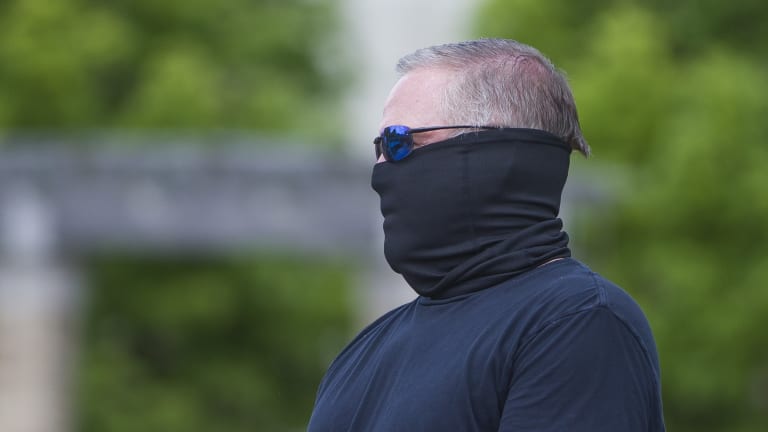
To Play or Not to Play: College Football Inches Closer to Decision

Risks and rewards.
On 4th and inches at midfield of a tight game, everyone from the head coach to the guy on his couch can evaluate risks and rewards: Either you go for it and try to keep that game-winning drive alive. Or you punt, hope to bottle them up and get the ball back quickly.
If only it were so easy with Covid-19.
The problem is, nobody has been here before.
We know the rewards of finding a way to play football in a pandemic: The millions of dollars that fuel college athletic budgets. The loyalty of boosters who will be encouraged to write checks. And of course, the excitement, tradition and sheer joy of competition for the participants and spectators who live for this.
The problem is, we don’t have a true handle on the risks. How could we?
That’s why we keep throwing around the word "unprecedented.’’ And reaching for all of its synonyms.
Facts, fear and confusion are all creating a muddled reality.
The cautious approach says, "Why would people play football when they increase their risk against a disease that could be life-threatening or leave lingering medical issues?’’
The aggressive stance says, "We don’t know for certain how serious the medical implications are, especially for otherwise-healthy young people. We have to live our lives. There are serious consequences to giving up and quarantining, too.’’
On top of this, there is the anarchy of college football. In professional sports, a group of owners, a players association and a commissioner can sit down and weigh expert opinions—and come up with a plan. And, their television partners are not scattered all over the broadcast map the way they are at the college level.
College football is a federation—a very loosely based federation with a wide-ranging membership. For the smaller schools, financial implications dictate a shutdown. As you go up the rung of schools, depending on their financial situation, the stakes become much higher.
Even at the highest level, the Power 5 conferences, there is no formal forum for decision-making among the schools. And the players—the student-athletes—have no organized voice.
On top of that, geography is much more of a factor at the college level. Pro teams tend to be in big cities. Colleges are all over the density map.
So everybody’s weighing in.
Easy for students to say, "We’d be safer playing football than being unsupervised at home.’’ That might be true. But the responsibilities, including legal liability, are a very serious matter.
And signing waivers is not the answer.
Also, at some point, governors are likely to become involved. Colleges can decide all they want. If a state is spiking in virus cases, football, like everything else, is in jeopardy.
And then there’s the question of whether football should be played if a campus is not open to the rest of the student body. Even if campuses are tentatively scheduled to open, that’s all it is. A tentative decision that could change quickly.
Decision-makers need to make optimistic plans. That’s why it’s understandable that we have football schedules.
College football is important enough that every effort needs to be made.
But everyone also needs to understand that on fourth down, it not only might be better to punt. It might be disastrous to keep knocking heads with a sinister, persistent virus.
What’s going to happen?
In this swirl of uncertainty, with no way for all parties to sit down and make a decision that applies to all, everyone will keep feeling their way.
We have a pretty good idea that the Big Ten and Pac-12 are close to pulling the plug.
With all the problems in California and Arizona, which are home to half the Pac-12 schools, pretty tough to fight on.
The Big Ten seems very inclined to err on the side of caution. It already has experienced some Covid-19 setbacks, notably at Rutgers and Michigan State, but also at other schools.
Beyond that, Big Ten commissioner Kevin Warren has a son who plays football at Mississippi State. The question, "Would you feel it’s safe for your child to play?’’ is not hypothetical for him.
Other conferences will have to decide what’s right for them.
The SEC has bought itself more time by delaying the start of its pandemic season to late September. The Big Ten opted to go with a schedule that started early and allowed open dates for postponed games to be played.
I believe that very soon, the Big Ten and Pac-12 will postpone until next spring. I expect the ACC and Big 12 to reach that conclusion, too.
If the SEC wants to play football, I hope that works out for them. Whatever they decide, they should take the extra time they gave themselves by delaying the start of their season.
I think it would be weird if the SEC played on while the other conferences shut down. Then again, these are strange and scary times—times for which there is no road map.
Who’s right? What’s the right thing to do? The risks seem awfully high to many people—too steep for gambling. But we’ll see. On fourth-and-inches, sometimes it just depends on whether the breaks go your way.